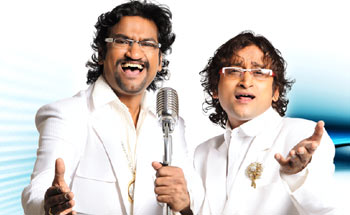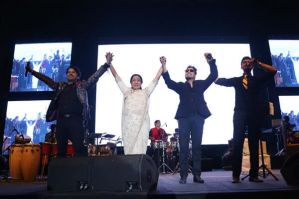Composer duo Ajay-Atul - 'In another five years, the Marathi film industry will be in the spotlight'

If you are the average local train travelling Mumbaikar, one song that you'll most likely hear on your journey is Wajle Ki Baara or Apsara Aali - both, probably on a loop.
It is not a surprise why the song is so popular. Marathi film 'Natrang', of which these two songs were a part (and several others) have been well received for its instant appeal. The music of this film was composed by popular Marathi composer siblings Ajay and Atul Gogavale who also bagged a National award for Marathi film Jogwa
Despite the recognitions and success, the duo prefers to keep a low profile, and probably that is one of the reasons why you won't find much material about the two in your wildest Google search. Did you know the the duo debuted with a Bollywood film? Or that they are huge fans of Illaiyaraja? Not only this, the duo have also worked on a couple of Telugu films. Yes, Telugu!
Radioandmusic.com's Chirag Sutar speaks to the composer duo to bring you more such surprises... read on
I have to admit it was hard to get in touch with you..
Atul: (smiles) We have never had a PR or believed in publicity. We just believe that as musicians our job is to make music. We know that people know very little about us, but I think it is a good thing.
Good? why?
Atul: Let them listen to our music, what we do otherwise is not important.
The music of Natrang has been so widely appreciated, not just among Marathi, but also non-Marathi audiences...
Atul: (long pause) Which (marathi) film in the last 50 years has been worth watching? Natrang and Jogwa had strong subjects, which any film-maker has rarely explored.
I discovered Natrang's music while travelling in a train, and though I do not listen to much Marathi music, I felt the music of Natrang was very special. Tell me, how did those fantastic melodies happen?
Atul: We worked on the sound track in November 2008. Sometimes, we finish a tracked in five minutes, while on other occasions, it took as long as three months for some inspiration to strike us. But as musicians, we strongly believe that unless and until a melody comes out spontaneously, we do not really work on it.
Ajay: (nods in agreement) We don't do made to order stuff. If someone tell us, please compose a romantic track - we won't do it. In fact, until and unless we are convinced about the melody ourselves, we don't even make anyone else hear it.
Then I believe Natrang's music would have come up instantly...
Atul: Yes, it was very instant. And one of the reasons it was instant was because we ourselves had not done that kind of music . I believe there was some kind of longing in us. I won't say that it was difficult, after all the 'Lavani' is the territory of Marathi musicians - if a Marathi won't compose a good Lavani, who will?
Ajay: (quickly adds) It's not surprising for us because the kind of music that was created for Natrang was always in our genes. I believe people liked it because 'all wanted it', but nobody was able to satiate their hunger for such music, because no one attempted to create it
Prior to Natrang, did you work on lavanis?
Atul: (quickly) No... we dind't really 'research' on the subject or anything, it was nothing new for us - whatever we have heard since our chilhood like Kakad Aarti, Gondhal, Tamasha has something in common with it. And we were fortunate to have grown up hearing those things.
Any memories of making of the songs like Natrang's Wajle Ki Baara or Apsara Ali...?
Atul: Apsara Ali was composed in hardly three to four minutes... our effort while making the song was to bring out the grandness of the Lavani. Actually, the 'Apsara' here is the 'Lavani' and even though the Lavani is looked down upon for being vulgar, at the end of the day, it is an art. Just as a Warkari is passionate about his Bhajans, those who do Tamashas, are passionate about their Lavanis. We wanted to highlight that same passion. There is also some amount of raunchiness about Lavanis, so we had the hard core approach. The dholak you hear on the song is not mellow or soft - it's loud but still intricate - in a way that it fills your ears
Ajay: The dholak that you hear is played by Vijay Chavan. And it had to be loud for a reason. During the olden times, there were no mics - everyone played loud.
Jogwa got you a National Award... did you ever expect that the music of Jogwa will get such recognition?
Atul: Seriously, we didn't even think of awards. What we do is... we do whatever we like with honesty. And once it's out, it belongs to the people. They can do whatever they want to do with it. We don't keep any expectations. And there is no formula for winning an award, sometimes it even happens that musicians end up thinking - how the hell did I get award for this track? It's best not to have any expectations.
Ajay: To work is very important. How you decorate the song, how you looking at the song, that is very important. Once it goes out to the people, they have their own way of looking at it and interpreting it
Marathi music for long has been waiting for that high... do you feel the works of Marathi composers often get overshadowed?
Ajay: I believe we were hurt at some point. We used to wonder - why is it that everybody prefers Hindi? In spite of Marathi being so close to Hindi? The fact is that a majority of the Marathi population listens to Bollywood songs and even to Hollywood tracks.
We felt probably that was one of the reasons why people from the Marathi Industry moved to other Industries. In our effort, what we tried to do was to make people listen to Marathi music that appeals to all. We believe, if we start now, it will get stronger and judging by the way it is progressing... I believe in another five years, Marathi Film Industry will be in the spotlight
Interestingly, Marathi films are now being liked by non-Marathi audiences too...
Atul: Because Marathi films are raising their bar. It's no more about just comedy. The characters and subjects are evolving - its not more about Patil's, Sasu-Sun, Sarpanch (village head) or Darodekhor (dacoit). I think the fact that we are moving away from these subjects is a very good sign. But I believe five years down the line, Marathi industry is going to skyrocket mainly because of the experimentation that it is doing. Tell me, will any leading actor wear a saree in Bollywood? Will any lead actor dare to play a eunuch? Marathi as a language is very rich and has a literature bank that dates back to over 1000 years. Who started films? it was Dadasaheb Phalke - a Marathi man!
Apparently, your first film was for Bollywood...
Atul: That's right, it was Tusshar Kapoor's Gayab. It was later that we worked on Marathi films But our most commercially sucessful work was Sahi re Sahi, and Vishwavinayak.
You also did a couple of Telugu films. Are you working on any at present?
Atul: We are being offered, but right now we have a lot of work on Marathi films..
There were rumours that you were working with Sanjay Leela Bhansali?
Atul: That is not true. He told us that he liked Natrang, but we are not working with him. He has been following our music long before Natrang happened. He is someone with a very good music sense. We know that whenever he thinks that Ajay and Atul will do justice to his project, he'll definitely call us.
Are there any Bollywood projects you are working on?
Atul: There are some, but I cannot disclose those. What I can share is that we are doing music for a film produced by Hema Malini.
Since you work on Telugu, Marathi and Hindi - how do you work around with the language? Is it not challenging?
Ajay: Language is not a barrier for any kind music. One just needs a soul to understand music. For instance, there are so many Punjabi songs which a non-Punjabi won't understand, but still the musical message is passed and touches the listeners. We consider ourselves very fortunate that we understand this.
What kind of music do you personally like?
Ajay: Our music taste is extreme - we either like rural / folk music or when it comes to English music - rock, jazz (at its purest) - we don't like anything that is in the middle
Atul: Whichever music touches us - we like that - it can be anything. The song should touch your soul - then let it belong to any language or genre. Even while we are composing that is our effort.
I read that you have never had any formal training in music.
Atul: We didn't learn music anywhere, but I will say, music taught us. Whatever we have heard till now is all on our lips. The other day someone asked me - do you understand notations? I said we don't need notations for our songs, and why just our songs, we don't need notations for anybody else's compositions too because we know each and every music piece by ear. A few days at Pyarelalji's place and we sang some songs for him, to which he said, 'I have completely forgotten about these songs, good you know them.' That was an honour
Ajay: Whatever music has come to us till now, we have absorbed that.When we were listening to music there was no one who told us - this is good or this bad. I think that worked to our benefit because we heard everything.
And you also appreciate Illaiyaraja a lot... what do you like about him?
Atul: (excitedly) Every one should appreciate him and he deserves the highest praise. He is like God for us. We didn't learn anything from him in person, but after listening to him we got to know what is what, what is soul and that music has the power to make you speechless.
Ajay: Many people know that music can move your body, but actually it goes beyond... it can break your heart, it can play with your heart, it can inspire your heart and we learnt all that after hearing Illairaja' songs.
Send in your comments to: chirag.sutar@indiantelevision.co.in

















